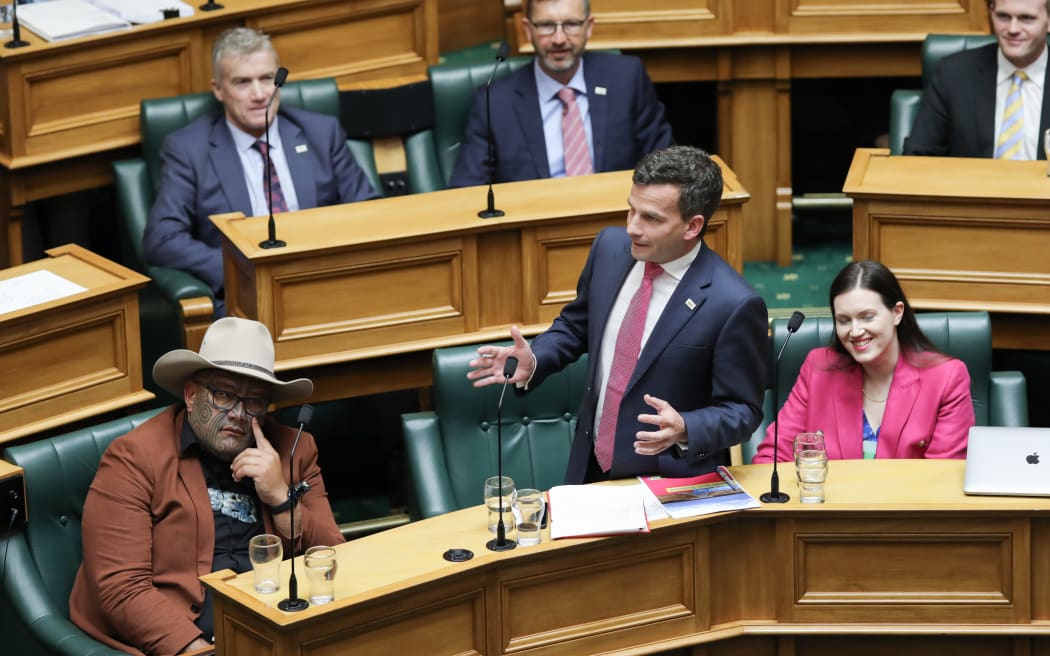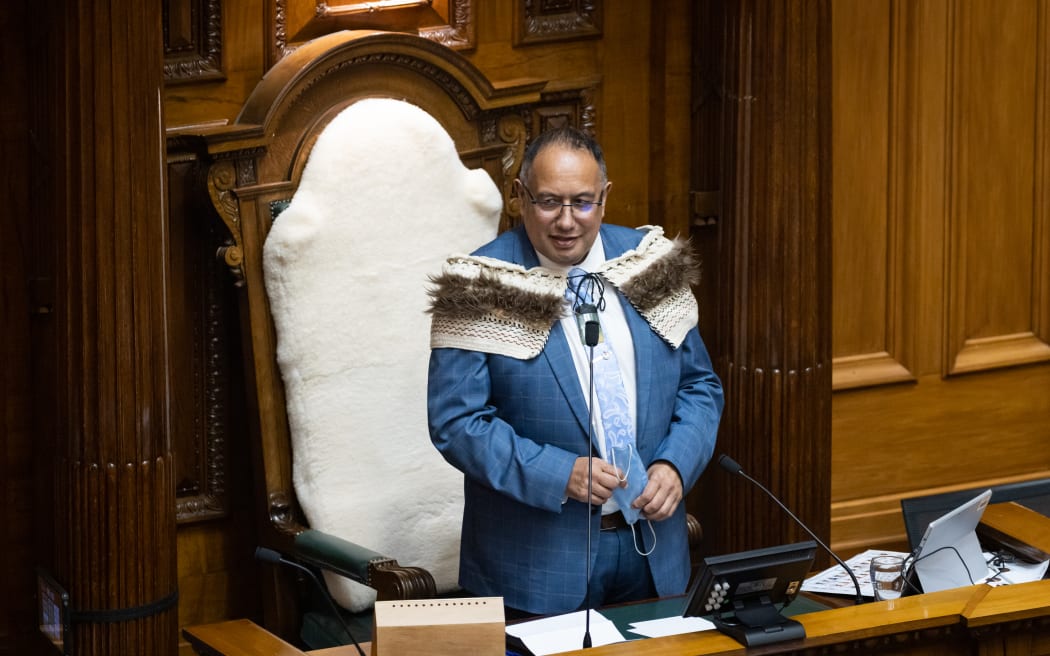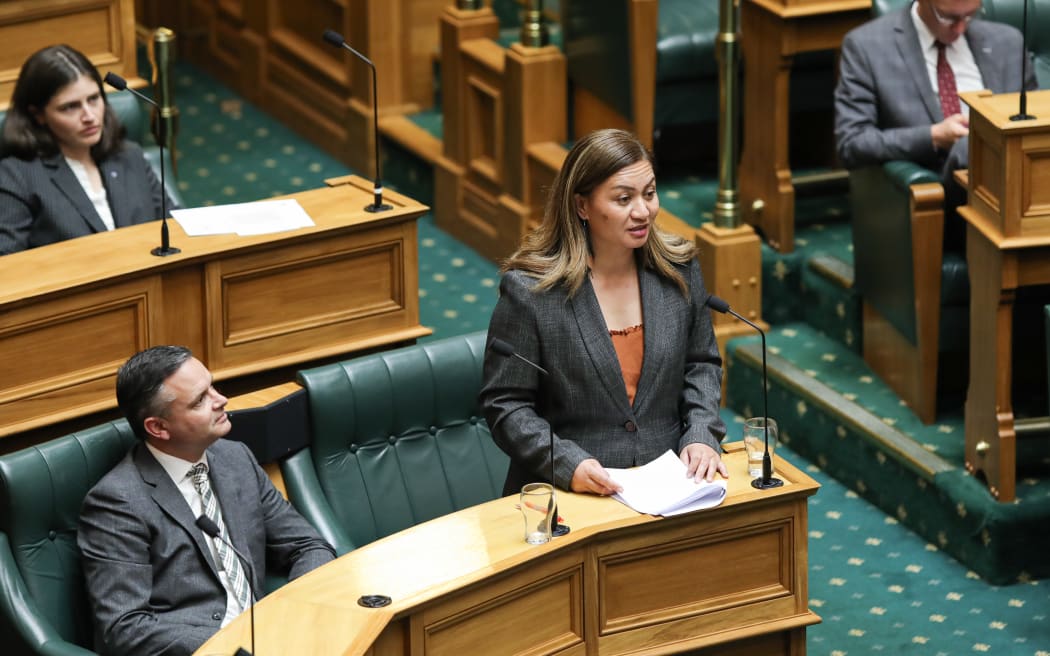
David Seymour’s attempt at asking a question in Te Reo Māori fell flat but it was followed by a barrage of supplementary questions by his party members, all slight variations on the same question. (File photo) Photo: ©VNP / Phil Smith
Repetition is often used in Parliament as a political tool to get a particular narrative seared into the public discourse.
It’s likely with this strategy in mind that the opposition ACT Party has this month employed a new tactic during Question Time in Parliament: the use of consecutive supplementary questions by different party members which follow the same theme and structure.
This week, Opposition MPs became fixated on a tool used by some hospitals in Auckland and Northland whereby prioritisation of non-elective surgery wait-lists is based partly on ethnicity, alongside several other criteria including the person’s time spent on the waitlist, their geographic location, and deprivation level, and most importantly clinical need.
MPs from the National and ACT parties zeroed in on this ethnicity factor, ostensibly out of concern that Māori and Pasifika are moving up the wait-lists unfairly.
This is despite research establishing that long-term inequalities in New Zealand’s health outcomes reflect ingrained discrimination against Māori and Pacific people in the health system, and the pandemic having shown that these groups of people generally wait longer for surgery.
Barrage of questions
Questions regarding the ethnicity factor in the wait-list tool dominated Question Time on Tuesday. After Prime Minister Chris Hipkins had responded to Opposition Leader Christopher Luxon's primary and supplementary questions about crime and the economy, the ACT Party asked some supplementaries of their own.
Notwithstanding a clumsy attempt by the ACT leader David Seymour to ask a question in Te Reo Māori - which the Speaker Adrian Rurawhe concluded was not actually a question - junior ACT MPs moved in for the attack with a barrage of questions for the prime minister about the wait-list tool.
First, it was Nicole McKee asking Hipkins if he deemed it acceptable that as a Māori woman she could be placed higher on a surgical wait-list than someone of a different ethnicity, even if their clinical need, time spent on the wait-list, location, and deprivation levels were the same.
This was followed by Karen Chhour asking Hipkins if it was acceptable that her Cambodian husband could be placed lower on a wait-list than her (Chhour is of Māori descent) even if they met the same criteria, apart from ethnicity.
Next up, James McDowall asked if it was acceptable if his 5-year-old, half-Chinese daughter could be placed lower on a wait-list in the same way.
Then Damien Smith asked if it was acceptable that migrant workers could be placed lower on the wait-list due to their ethnicity. You get the idea.

Speaker Adrian Rurawhe had his work cut out for him during the ACT Party's supplementary question pile-on. Photo: VNP / Phil Smith
The ACT MPs had fired a fusillade of shots at the prime minister that were all slight variations of the exact same template. They'd amplified a key ACT message heading into October’s election, and in the process imparted an impression that the party is working tightly as a team as well as showing the public a little of the personal side of their MPs.
In response to these questions, Hipkins sought to explain that clinicians had developed the wait-list prioritisation tool in order to remove discrimination against people if they are Māori or a Pacific Islander, but also if they are from a rural community, or from a low-income background. You can watch the pile-on as it was broadcast on Parliament TV here.
Operation Supplementary Thunder
The ACT Party had launched an earlier pile-on in this repetitive fashion through supplementary questions during a Question Time two weeks ago. That time it was related to the recently resigned Transport Minister Michael Wood’s controversial shareholding in Auckland Airport.
Seymour kicked it off by asking Hipkins if he was confident that officials and Ministers were making decisions transparently and impartially.
Following the prime minister’s reply, six more ACT MPs asked how Hipkins could be confident in the transparency and impartiality of ministers or officials in various public agencies if he couldn't trust his own transport minister to declare shares in Auckland Airport when declining "airport authority" status to the North Shore Aerodrome?
One by one, the ACT MPs got up to ask their version of the question, while their party colleagues around them could barely conceal their grins. The questions just kept coming, interrupted only by a couple of points of order from the government side and the Speaker deciding things were in order.
ACT would likely have kept going with these questions but they’d already used up the party’s daily allocation of supplementaries.
Testy exchanges
Whether this new parliamentary tactic is constructive in the chamber is debatable, but in both instances they sparked testy scenes.
In the first case, Labour MPs took umbrage at what it characterised as impugnations on the character of a range of public servants, public service agencies and ministers. Things got heated around interjections, and it was clear the questions had left a bad taste for Labour. But Rurawhe didn't find the questions out of order.
The Speaker said "it's really important that members ask—are able to scrutinise everything that the Government does. If the Government doesn't want to be scrutinised, that's the message you are giving right now by interrupting, interjecting while questions are being asked".
In the latest case, Green Party co-leader Marama Davidson raised a point of order and linked ACT’s supplementaries about the wait-list issue to an attempt to stir racist opinions among the public. She referred to a previous speaker's ruling that it is incumbent on MPs to take care about wider consequences of their statements and questions in Parliament.
Rurawhe scolded Davidson for making such an accusation in the House, and asked her to withdraw and apologise, before ejecting her from the chamber when he found that her apology was not delivered properly.

Marama Davidson Photo: ©VNP / Phil Smith
Groundhog day
Repetition is nothing new in Question Time. Indeed for months, including this week, National’s Mark Mitchell has been asking the Police Minister Ginny Andersen the same question about whether she stands by a statement she made that in her view New Zealanders feel safer, and getting the same answer pretty much each time.
Mitchell had similar templates that he used repeatedly in questions of former Police Minister Poto Williams in QT for most of last year. Repetition is also infectious, and Mitchell’s stock question to the Police Minister has this week also been taken up by Nicole McKee who, unsurprisingly, got the same kind of answer from the minister.
The trouble with repetition is it can become tedious. If ACT have sought explosiveness by latching on to the repetitive pile-on tactic during supplementary questions, they may have initially succeeded, but there’s a risk that in Parliament terms it will prove tiresome and increasingly be seen as a waste of time of everyone’s time.

